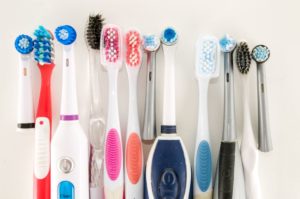
You likely already know that brushing your teeth is one of the simplest and most effective methods of preventative care for your oral health. It clears away debris so that plaque is less likely to develop, and it helps keep your gumline clear of germs. However, not all toothbrushes are equal! Electric brushes have been touted as having clear benefits over manual brushes.
Perhaps you haven’t made the switch to electric yet and are wondering whether it’s really worth the hype. If you’re curious about what method would keep your mouth cleanest, keep reading to learn the pros and cons so that you can decide!
Benefits Of Electric Toothbrushes
Electric toothbrushes are usually battery-operated and have a detachable head for the bristles. This head is electrically powered to make rapid automatic motions. Scientifically speaking, electronic brushes have been proven to be more effective than manual ones at keeping your mouth clean for a few reasons, including:
- They remove more plaque. Studies have shown that this method can be up to 17% more effective than manual toothbrushes.
- They can be easier to handle. The bristles move back and forth, or in some cases oscillate (rotate) on their own as you run them over your teeth. That means you don’t have to put in the same effort as with manual toothbrushes to achieve the same impact. This can be especially beneficial to children or those with mobility challenges.
- They can include reminders like timers, pressure sensors, and alerts that let you know when you need to replace the head.
Why Wouldn’t I Want An Electric Toothbrush?
The drawbacks to electric toothbrushes mainly are cost and convenience. Depending on the brand and quality, you can spend anywhere from $15-$250 for the device itself. You’ll also need to account for extra brush heads which can range from $10-$45.
Not only that, but different brands have different types of head attachments so there’s no universal type that you can purchase. That means you might have a harder time finding refills or may need to purchase them online.
The Benefits of Manual Toothbrushes
While these more simplistic toothbrushes also clean your teeth, they are simply less effective than their electric counterparts. That said, there might be some reasons you should opt for a manual toothbrush instead of its electric counterpart, such as:
- Variety. These come in several sizes and can be softer or firmer depending on your preferences. That means you are sure to find one that will meet your needs. If you have a brush that’s hard on your gums, for example, it’s easy to buy one with softer bristles.
- Availability. They’re carried in almost every store and pharmacy nationwide, so you can find one quickly and conveniently. If you’re traveling and forgot yours, or something happened and you need a new one fast, it won’t take long to get a substitute!
- Cost. These brushes can cost as low as $1 to $3 in some cases. Also, there’s no need to stock up on brush heads or purchase expensive batteries.
In conclusion, it’s safe to say that electric toothbrushes keep your pearly whites cleaner with less effort. However, if you’re not able to afford one, then manual toothbrushes are clearly your best bet. Either way, regularly removing plaque and bacteria is the number one best preventative care strategy. If you are keeping up with healthy oral healthcare habits and dental visits, rest assured that you should have no cause for concern!
About The Author
Dr. Nicholas Baioni completed his undergraduate degree at the University of Arkansas and then received his doctorate at the University of Tennessee Health Science Center. He prioritizes cleanliness and efficiency while providing trustworthy care that his patients come to rely on. If you would like to schedule a checkup, please contact the office on the website or by calling (479) 370-2239.

